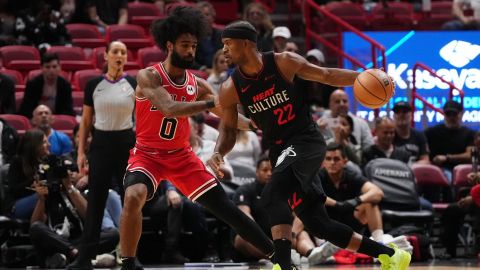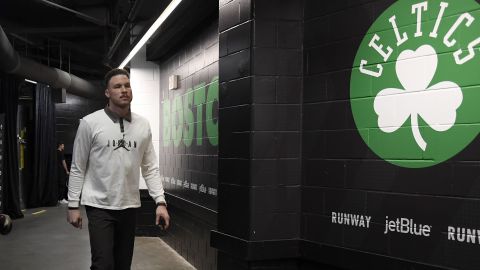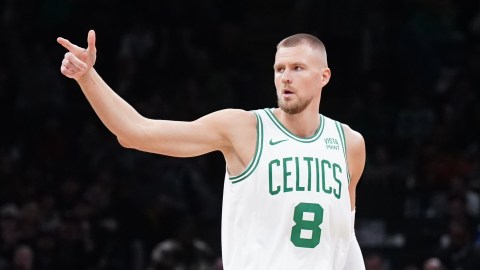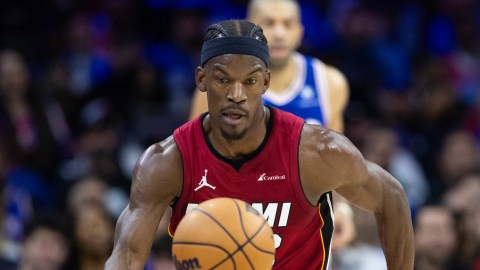It took Rajon Rondo some time to bloom.
He didn't enter the league with the fanfare of Brandon Roy or Randy Foye or J.J. Redick. He flew under the radar — but you have to believe that's exactly the way he planned it. How can you shock people if they're expecting it?
The key to Rondo's success has been patience. It's reflected on the court in a sense of calm that belied his 21 years when he led the Celtics to Banner No. 17 in 2008. That same patience propels him off the court, too. Rondo doesn't rush; he doesn't try to do too much, even if that means uprooting from Louisville to Virginia so he can fine-tune himself for the transition from high school phenomenon to Division I athlete.
Doug Bibby, who coached Rondo at Louisville Eastern, encouraged Rondo to spend his senior year at Oak Hill Academy before setting out for the University of Kentucky.
"I had done all I could for Rajon," Bibby told the Kentucky Sports Report, "so I sent him to Oak Hill where he would be playing a much better schedule night after night."
Oak Hill was like an early taste of college for Rondo. The schedule was more competitive, the players were more talented, and it offered a broader perspective on exactly what kind of skill Rondo would be using as a measuring stick for his own success in college and beyond. Jerry Stackhouse spent a year at Oak Hill; so did Carmelo Anthony and Kevin Durant.
Rondo followed suit, and it paid off.
"Oak Hill is not for every kid," Bibby said, "but I feel that experience was a huge benefit to Rondo. It's like a year in college. It helped him to focus on class work."
During his year at Oak Hill, Rondo set a school record when he tallied 27 assists in a game — and he broke that record later in the season when he had 31. During a tournament game in Europe, he scored 55 points, the second-highest total in school history. He finished his year averaging a double-double (21.0 points per game and 12.0 assists) and became the school's all-time single-season assists leader.
When it was time to play for Tubby Smith at Kentucky, Rondo was ready. He was still a little bit small and could stand to add a few pounds to his lanky frame, but during his time at Oak Hill, he had developed into an incredibly quick point guard with solid body control and impressive ball-handling skills. During each of his two seasons at Kentucky, he boasted field-goal percentages of 51.0 and 48.2, and during his final season, he led the SEC in assists (4.9 per game) and led the team in rebounds (6.1 per game).
Still, there were obstacles.
Often, Rondo has been knocked for his maturity, or his lack thereof. During high school, Bibby had to suspend the talented guard for 12 games and, on occasion, found him difficult to coach. Sometimes, Rondo just didn't want to listen.
Fortunately, Rondo's mother, Amber, was the one person whom he would listen to.
"[Amber] was the driving force behind him that made it possible for me to reach him," Bibby said. "She stepped in and said to him, 'Either you listen to Doug, or you don't play.'"
The maturity knock cropped up again last summer, when Celtics GM Danny Ainge – who was struggling to work out an extension to keep Rondo in Boston – indicated on a WEEI radio show that his young NBA champion point guard still had plenty of room for growth.
"We need him to be more of a leader," Ainge said in June 2009. "He's got to grow up in some cases, and I think he is, too. Slowly but surely, Rondo is maturing. He's getting a little bit more control over his emotions and he's responding in a more positive way as he gets older and more mature in the league."
It seemed to be a sensitive subject for Rondo. Here was a late-first-round draft pick who had commandeered his team to a world title in just his second full season in the league, and his own GM was publicly questioning his leadership skills?
Rondo wasn't happy, but in a perfect reflection, he didn't let it show. He stayed patient and reserved, although the same could not be said for his agent. After Bill Duffy fired some criticism back in Ainge's direction, Rondo signed a lucrative five-year extension with Boston and let his play do the talking in 2009-10.
Triple-doubles were nothing special for the point guard last season, as he averaged career highs in points (13.7), assists (9.8) and steals (2.3). En route to his first All-Star nod and a spot on the All-Defensive First Team, he became the first Celtic ever to lead the league in steals. In March, he broke the franchise record for steals in a single season, and a couple of weeks later, he broke Bob Cousy's record for the most assists in a single season.
Back in 2006, when the Celtics acquired Rondo from Phoenix in exchange for a future first-rounder, he was expected to be good. It's unlikely that many expected him to be this good – good enough to be the key deciding factor in a postseason series win over the NBA-best Cavaliers this year, good enough to win an NBA championship at the ripe old age of 21.
A few years ago, the Big Three phenomenon swept through New England. Now, no one dares mention the Big Three.
Now, it's the Big Four.



